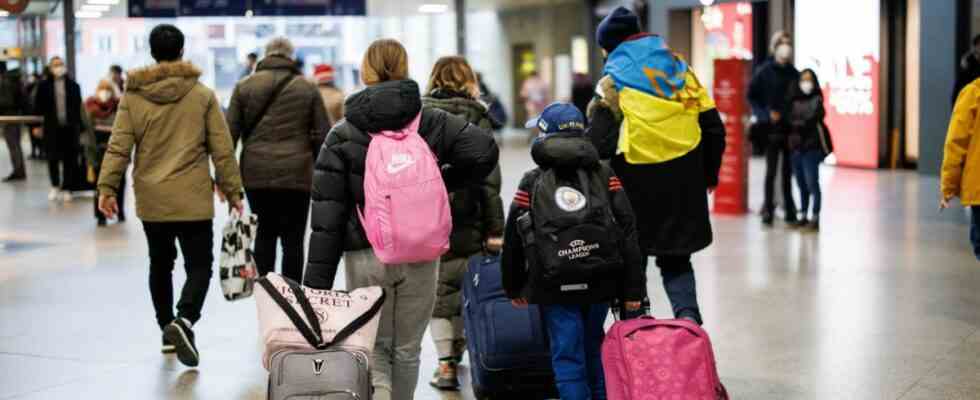In the past few weeks, thousands of Munich residents have agreed to provide private accommodation for refugees from Ukraine. The mediation runs through the association “Munich Volunteers”, which was founded in 2015 when thousands of refugees, mainly from Syria, arrived. In the meantime, the association is probably the largest placement exchange for voluntary help in Munich. So far, more than 5,000 people have been placed in private quarters, says Chairwoman Petra Mühling.
Where can providers and refugees register?
Anyone who wants to offer overnight accommodation should register online using a form on muenchner-freiwillige.de. Refugees can also register online and state their needs. Or you can come in person to the Elisenhof directly at the main train station (entrance at the corner of Prielmayerstraße and Luisenstraße), where the association now uses rooms. There are mediation teams that register refugees, inquire about their needs and also contact suitable providers.
the “Advent calendar for good works of the Süddeutsche Zeitung” offers support to people in need – these days especially those fleeing the war in Ukraine. If you want to help, you can donate to the SZ Advent calendar:
“Advent calendar for good works of the Süddeutsche Zeitung eV”
Stadtsparkasse Munich
IBAN: DE86 7015 0000 0000 6007 00
BIC: SSKMDEMMXXX
Purpose: Ukraine
You can donate online here. Every donation goes to a good cause without any deductions. Süddeutsche Verlag bears all material and administrative costs. An overview of the other options available for providing aid to war victims can be found at: www.sz.de/ukrainehilfe
Which offers are accepted?
All. From a place to sleep for a few nights to a room for a few weeks to a complete apartment for months or years. Petra Mühling says that places for a few nights are currently in high demand because many refugees want to continue their journey. However, longer-term offers are often required, since many also want to stay in Munich. Anyone who wants to rent an apartment to refugees on a permanent basis can also do so through the association. He rents the apartment with a commercial lease and rents it out to refugees; The contact for landlords is therefore the association. In recent years, says Mühling, almost 100 apartments have come together that are rented out to refugees, no matter what country they come from.
Are tenants allowed to take in refugees at all?
Yes, according to the tenant association. As long as someone lives in the apartment for a maximum of six to eight weeks, this is formally considered a visit, and you don’t even need the landlord’s okay for that. For a longer period of time, however, the owner’s approval is required, as well as if someone wants to leave their entire apartment to refugees. Tenants who demand money from refugees always need the consent of the landlord, regardless of the duration.
Can a provider ask for rent?
Yes, that is possible. However, the Munich volunteers prioritize free offers when placing them, because many refugees initially have little or no money at their disposal. Since Ukrainians receive state support under the Asylum Seekers Benefits Act, the state also covers rental costs.
How is the reliability and honesty of the people who offer accommodation checked?
This question arises in the face of reports, or at least fears, that shady people might try to get close to women or children, for example, via the accommodation service. However, the association is not able to check the providers, stresses Petra Mühling. In this emergency situation, one cannot personally check the providers or have a certificate of good conduct presented. But what the association does: record the names and addresses of the providers. All mediated refugees would then have to make sure themselves that everything is okay with the host or landlord. The association is not liable for possible negative consequences of mediation.
According to which criteria are refugees and providers brought together?
“Matching” is what they call it at the club, and it’s done by mediators, usually in a team with interpreters. They check the need – i.e. first the number and age of the refugees, whether they have pets with them and the desired duration – and see which offer might suit them. If the teams at the Elisenhof have the impression that a certain offer might be suitable, they call this person and arrange a meeting point. Most of the time, the person should come to the Elisenhof, where the data from the ID card and address will be recorded and he or she will be introduced to the refugees. When both sides feel like they get along, they can break away. If one side has concerns, they should express it, says Mühling.
How fast is mediation?
Often very quickly, says Petra Mühling, then only a few hours elapsed between the submission of the offer and the call from the placement team with the request to come to the Elisenhof. Sometimes it takes a few days or weeks before an offer is called up.
Which neighborhoods are most in demand?
Accommodations for four people are needed most often, says Petra Mühling, although the association does not differentiate between adults and children. But most offers come in for two people.
Do refugees also have to be cared for and fed in their private quarters?
Hosts and refugees should clarify this among themselves, the association stays out of it.
Are refugees from other countries also placed in private quarters?
No. These refugees go through the normal asylum procedure and are initially accommodated in state or municipal accommodation.
Where can I find more information?
To arrange accommodation muenchner-freiwillige.de. On the urban side muenchen.de/ukraine is information for people who want to take in refugees. The Caritas portal is also constantly being expanded: welcome-in-muenchen.de.

